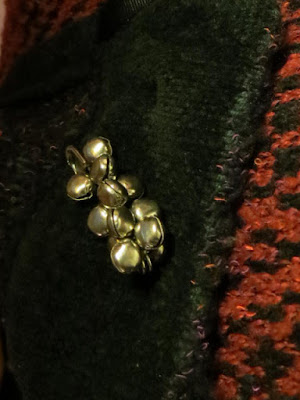 |
| Photograph by Marjorie Farrell |
An essay's conclusion, writes William Dereshewicz, is not something we refer
to as a fact but rather as wisdom. He allows that the ideas in an essay are
“often openly impressionistic and provisional, colored by feeling, memory and
mood,” going on to say,
But the essay draws its strength not from separating reason and
imagination but from putting them in conversation. A good essay moves fluidly
between thought and feeling. It subjects the personal to the rigors of the
intellect and the discipline of external reality. The truths it finds are more
than just emotional. – William Dereshewicz, “In Defense of Facts,” The
Atlantic, January-February 2017
Not
every reader is as fascinated by the essay form and its history as I am, but
anyone who has been awake this past year realizes that there have been bloody
assaults on truth and facts, and many of us find that cause for concern.
Although
my new Atlantic
arrived last Friday, it wasn’t until Sunday afternoon that I got around to
Dereshewicz. I’d started the morning with the longest piece in the issue, “My
President Was Black,” by Ta-Nehisi Coates. Mine, too, I want to tell
Coates, and I have a lot more to say about that, but I’ll save it for another
time. For now let me just say that all my readers who don’t subscribe to The
Atlantic should
go right out and buy the current issue, because the Coates article alone is
worth the cover price. After you read the whole issue, you’ll probably want to
subscribe. I hope so.
Here
are a few lines from the editorial in the current issue:
Obama is not an unalloyed idealist. He has complicated feelings
about the nature of humanity, and harbors few illusions, in particular, about
the moral systems that govern many other countries. But he has always seemed
sincere in his belief that America is a place that possesses a unique capacity
to become better, and then better again. “The arc of the moral universe is
long [my emphasis added], but it bends toward justice,” he often said,
quoting Martin Luther King, Jr., but he really meant that America’s arc bends
toward justice.
That
stopped me in my tracks. Light dawned, belatedly, in one bookseller’s brain!
The title of Kathleen Stocking’s book: The Long Arc of the Universe – that was her
reference!
Originally
I didn’t care for the title. It seemed vague and having little to do with the
content of the essays – but only because I had completely missed the
allusion!
When I’d shared my initial misgivings about the title with the author, she
kindly refrained from pointing out my ignorance. I wish now she had not been so
careful of my feelings!
Because
now it makes perfect sense. It captures perfectly Stocking’s optimism in
the future, a clear-eyed optimism she shares with President Obama, despite hard
truths both have faced in this world.
Neither
Obama nor Stocking is optimistic because they live in ivory tower isolation.
Both have served – Obama in Chicago activism, the Illinois Senate, and the
White House; Stocking in country schools, California prisons, and in the Peace
Corps – in ways and places demanding a pragmatic, hands-on, the-buck-stops-here
approach to problem-solving. Neither can say that the problems they tackled are
now only historical footnotes. That should go without saying. Problems persist.
The world is hard on people, and it’s harder on some than on others. But, like
President Obama, Kathleen Stocking continues to have faith in the human
capacity to become better and to make the world better. And both can say they
put themselves on the line, personally, to do something toward that
end.
Obama is quoted in the Coates article as saying, elaborating on the
statement of Martin Luther King, Jr.,
To be optimistic about the long-term trends ... doesn’t mean
everything is going to go in a smooth, direct, straight line....
Well,
if optimism had to mean that, there couldn’t be an optimist anywhere in
the world, could there? Kathleen Stocking wrote me in an e-mail, following the
November election:
Ruth Gruber died today. She was 105. She was in Germany hearing
Hitler's rants in 1932 and sounded the alarm, but no one heard. She
photographed the people in the camps, the boats of refugees turned away by
the British warships from Palestine, and so on. It can happen again. And it can
happen here. There's no doubt at all in my mind about that. But I also believe,
with Obama (that whippersnapper, that youngster) that history is not a straight
line. Our species is evolving toward greater and greater consciousness, but
there is backsliding, detours, and the process is slow, in any event. Julian of
Norwich had to pretend she couldn't read and write and that everything was
coming from heaven and had to be translated. Because any woman who could read
or write was in league with the devil. As we all know.
But
as she writes in her most recent book of personal essays, The Long Arc of
the Universe: Travels Beyond the Pale:
The hard thing about living anywhere, I decide, and traveling in
general, is that one can never live long enough or see enough of the world to
fully understand the long arc of the universe and make sense of it. Little bits
are all we get, and it’s never enough to see the big picture.
 |
| Holiday decorations by Kathleen Stocking |
I do not call myself a pessimist. At the same time, I often find it hard to be
optimistic about “the big picture.” Little corners, yes. Pockets. Certain
stretches of time here and there. But it’s true that none of us gets to see “the big picture,”
the “long arc.” Kathleen Stocking and President Obama, however, remain
optimistic in their long views, and they have seen much more than I can claim
to have seen, so I’m taking their words seriously.
The
philosopher of my heart is Henri Bergson, who lived in France from 1859 to
1941. In his heyday, he had been the equivalent of a rock star. The public swarmed
his lecture hall at the Sorbonne – it was the place to be! – and
finally a section of seats had to be cordoned off and reserved for students,
because socialites had started coming in to the lecture preceding Bergson’s to assure
themselves seats for the star.
Never
a novelist, always a philosopher and teacher, he was nevertheless awarded the
Nobel Prize in Literature in 1927, but by 1940 his star had faded, and he lived
quietly, out of the limelight. Then came the Occupation. Bergson’s earlier
glory was not forgotten by those who had assumed power. Eager to piggy-back on
his reputation, they offered him blandishments, their recognition – which
apparently they thought would be an irresistible inducement. Bergson said no.
The
immediate cause of his death during the Nazi occupation of Paris was
bronchitis, but I have always suspected heartbreak. Ill for many years with
crippling arthritis, on the arm of a caregiver he left his sickbed to register
as a Jew, despite Nazi assurances that he was “exempt” from the new, odious
racial laws. Again, he could have sold out, but he didn’t.
Bergson
died on the fourth of January, 1941, and I have always imagined him on a cold
winter day, in the city he loved, arriving home exhausted to die of a broken
heart – in part because he had been a most optimistic philosopher, sure that
the human spirit was evolving in something higher and finer -- and whenever I
have told the life story of Bergson to someone unfamiliar with his name, it has
been hard for me to keep tears from my eyes at the end. But the truth is that I
wasn’t there. I did not know him. And the day he died was probably not, as it
has always been in my imagination, the same day he stood in line to register
for his yellow star.
Undoubtedly he felt deep, wrenching sorrow for
what had come to Europe in his own last days, and I cannot imagine that his heart
did not
ache, terribly -- for the Jews, for France, and for the world. But that he chose to show solidarity
with the persecuted, though he had never practiced the religion, was a choice
entirely in line with his philosophy and his entire life. By his own definition
of freedom, that is, arrived at as early as his 1889 doctoral dissertation (Essai sur les données immédiates de la conscience), his was a free act in 1941, neither
mechanical reflex nor directed from anything exterior to his own soul. It came
out of everything he was, out of his entire life leading up to that moment.
And
exercising his freedom would have been, necessarily, for him, an affirmation
and demonstration of the possibility of freedom. Would he also have been able
to maintain, amidst the horrors of that time in history, his faith in the
evolution of the spirit?
 |
| Ready now for holidays |
Richard
Leakey of Kenya, when entering political life,
was asked by an interviewer, “Are you willing to give your life for this
country?” Leakey is a white man whose home is a black African country, and the
subtext of the question was that in running for office he might risk death. His
answer, however, spoke not to the risk of death but to commitment: “What else
does any of us have to give?”
It
is not for us to question life, Viktor Frankl wrote. Life questions us. How will we
answer?
An amazing, inspiring person! He saw the absolute worst of the twentieth
century and somehow kept faith in humanity.
How
do these people do it? How do they maintain faith and optimism, despite all
they see first-hand that could drive them to despair?
There
will always be those in the moral universe who blatantly steal and rob from
others, as there will always be the less obvious free riders, who simply manage not to pay their
legitimate dues. But at the same time there will also be, besides the mass of
responsible dues-payers, those who not only pay their own dues but who move
mankind forward (or at least keep us from being forever lost in the abyss) by being extraordinary, by doing more than their share, by achieving
wisdom and by serving as models for the rest of us.
Moral
progress, if there is such a thing, is not a smooth, direct line. Okay. There will be
backsliding. All right. But does it exist at all, this moral progress? Is the
human spirit evolving into something better? Was Henri Bergson able to believe
that still as he closed his eyes for the last time?
Martin
Luther -- not
my favorite guy! -- thought faith a matter of grace: You are given the gift, or
you’re not. But what if faith, like any virtue in the Aristotelian sense, is
a matter of
practice?
You get up every day, regardless of circumstances, despite difficulties, and
you do what you can. You’re as frightened as the next person, but you choose not to let
fear paralyze you. And doing what you can, one day at a time, despite fear,
strengthens your faith in the future and in your fellow human beings. Do you
think it might work that way?
It’s
the only way I can make sense of it – moral progress not as a matter of
inevitability, not operating blind like the evolution of the physical universe, but as
something created by human choices and actions. Because if the long arc of the
universe is to bend toward justice, is it not up to each of us to do our part,
though all we can see is our little bit of here and now?
Warmest holiday wishes, my friends. Keep the faith! And thank you for being in my life!
P.S. 12/23/2016 - Here is a very inspiring essay. My sister Bettie sent me the link. Merry Christmas, Happy Hanukkah, all!
 |
| Photograph by Marjorie Farrell |
 But
I have – we all
have – Jim’s books, and I cannot express the depth of my gratitude for that. He
got his work done.
He left us poems and stories, himself and his life distilled on pages, and
because of that, and for old times’ sake, I am able to close out this year with
my old friends. Ah, yes, we will, in our house tonight: We'll tak' a cup o'
kindness yet, for
auld lang syne!
But
I have – we all
have – Jim’s books, and I cannot express the depth of my gratitude for that. He
got his work done.
He left us poems and stories, himself and his life distilled on pages, and
because of that, and for old times’ sake, I am able to close out this year with
my old friends. Ah, yes, we will, in our house tonight: We'll tak' a cup o'
kindness yet, for
auld lang syne!
































